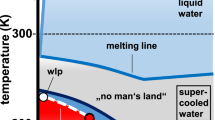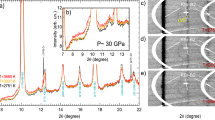Abstract
THE solid–fluid equilibrium curves (or melting curves) of ordinary substances cannot be studied over very wide temperature-ranges because of difficulties which arise from the fact that the melting pressure is always a very rapidly changing function of temperature. Thus even with the highest attainable pressures the melting temperature cannot be raised much above the ordinary liquid-gas critical temperature. However, further information in this field, particularly in relation to the question of whether a solid–fluid critical point exists, is desirable not only for its intrinsic interest but also on account of its importance in geophysics.
This is a preview of subscription content, access via your institution
Access options
Subscribe to this journal
Receive 51 print issues and online access
$199.00 per year
only $3.90 per issue
Buy this article
- Purchase on Springer Link
- Instant access to full article PDF
Prices may be subject to local taxes which are calculated during checkout
Similar content being viewed by others
References
Simon, F., Z. Elektrochem., 35, 618 (1929); Trans. Farad. Soc., 33, 65 (1937), see this paper also for references to earlier papers.
Simon, F., and Ruhemann, M., and Edwards, W. A. M., Z. physik. Chem., B, 2, 340 (1929); 6, 62 (1929); 6, 331 (1930).
Author information
Authors and Affiliations
Rights and permissions
About this article
Cite this article
HOLLAND, F., HUGGILL, J., JONES, G. et al. Solid Helium at ‘High’ Temperatures. Nature 165, 147–148 (1950). https://doi.org/10.1038/165147a0
Issue Date:
DOI: https://doi.org/10.1038/165147a0
This article is cited by
-
Creating two-dimensional solid helium via diamond lattice confinement
Nature Communications (2022)
-
The Liquid–Solid Transition in Helium Near Absolute Zero
Nature (1950)
Comments
By submitting a comment you agree to abide by our Terms and Community Guidelines. If you find something abusive or that does not comply with our terms or guidelines please flag it as inappropriate.



